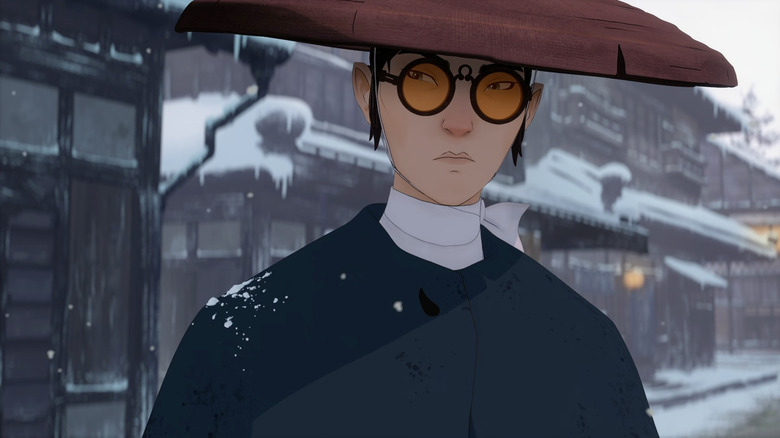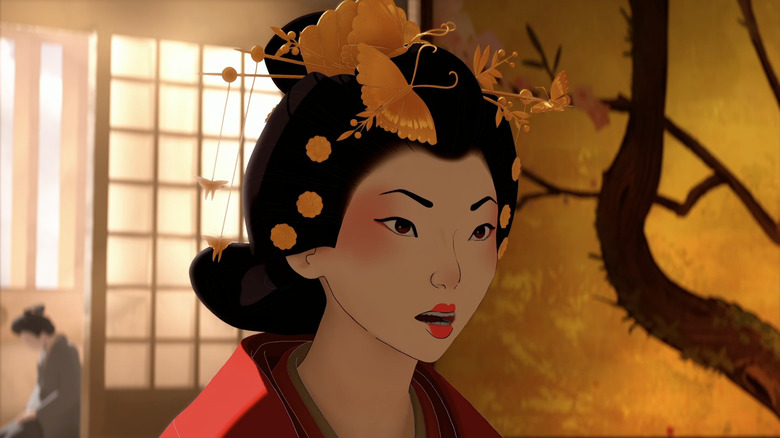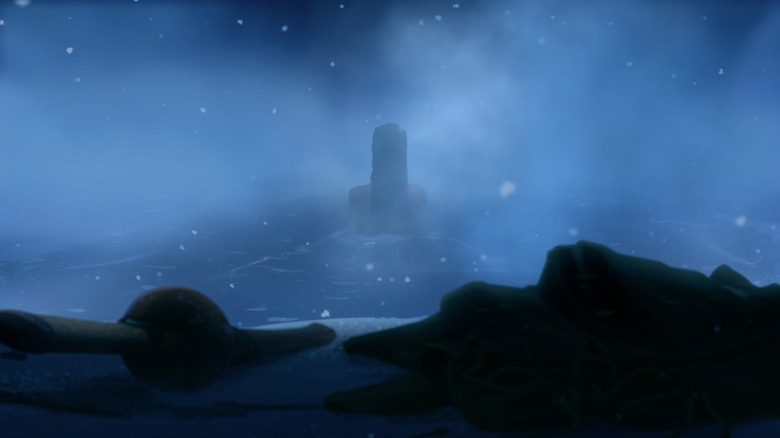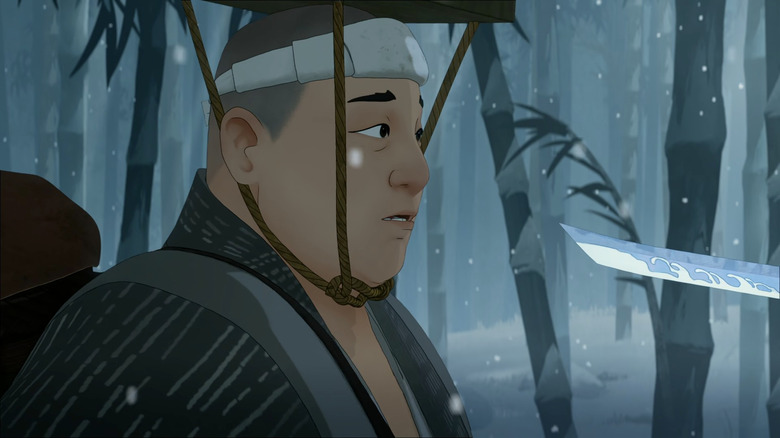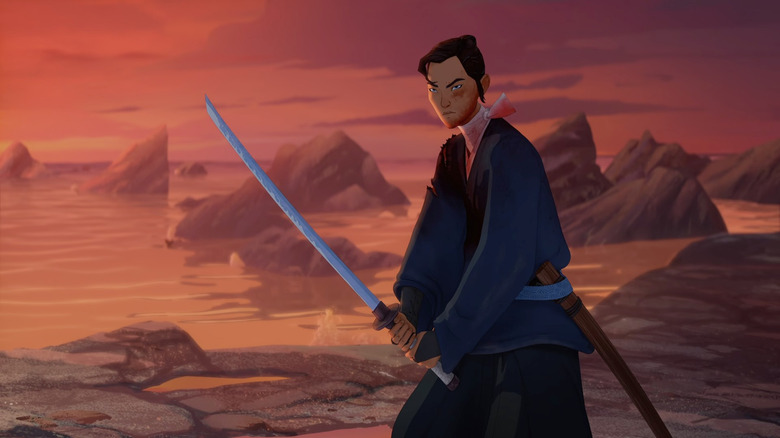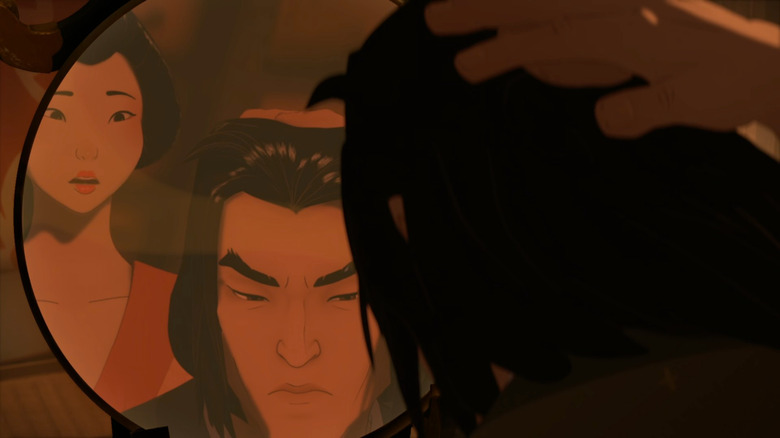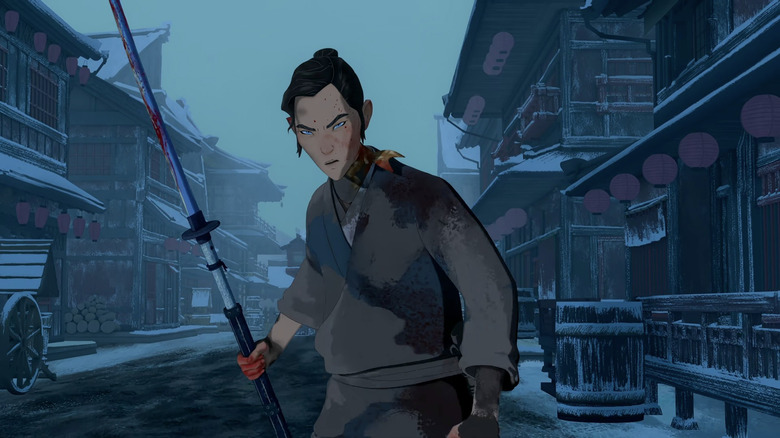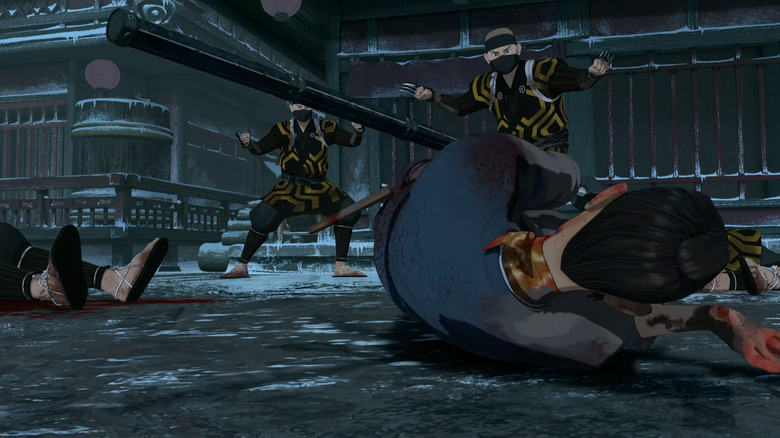Netflix's Blue Eye Samurai Showrunners On R-Rated Animation, A Possible Season 2, And More [Exclusive Interview]
This post contains spoilers for "Blue Eye Samurai" season 1.
In the new adult animated Netflix series "Blue Eye Samurai," Mizu (Maya Erskine), a young half-Japanese warrior, has to navigate a world which doesn't accept her for who she is. Set in the Edo period in Japan where white people were banned from the country, Mizu has blue eyes that betray who she is to people who cannot accept it. To get revenge on those who have wronged her, Mizu disguises herself as a man, and teaches herself to become a master sword wielder.
The series examines power, revenge, and gender expectations, and has character twists and turns you won't see coming ... yet which feel exactly right. "Blue Eye Samurai" comes to us from writers (and married couple) Michael Green ("Logan," "Blade Runner 2049") and Amber Noizumi. I got a chance to chat with Green and Noizumi about Mizu's choices, creating an R-rated animated series, the gorgeous animation, and more.
Note: This interview has been lightly edited for clarity and brevity.
'Akemi realizes that she needs a different path'
Amber, you spoke at the premiere about how the story draws from your own life, and I'd just love to know how you put your experience into the show set in a completely different time period.
Noizumi: When I was growing up, just the idea that the white features which I sought to highlight might be considered weird or unappealing. When I was trying to sort of hide my Japanese features, the idea of trying to hide your white features was this exotic idea. And when we started talking about it and in Edo period Japan where they wouldn't see white people or mixed race people, the idea of exploring that there — it is something that my siblings and I have talked about, too. Almost taking it as a compliment if somebody says, "Oh, I didn't know you're Japanese." "Oh, thank you." That's how we were in our youths, and having to unpack that over the years. And now doing it in an entertaining way was very cathartic.
One of the things that I so appreciate about this show is that it shows women trying to navigate a world with really few choices, and yet none of the women make an expected choice at all. So can you talk a little bit about the choices that Mizu and Akemi [Brenda Song] and Madam Kaji [Ming-Na Wen] make?
Noizumi: So Akemi, essentially we see her naiveté where she thinks she can control Taigen [Darren Barnet] by using sexuality and then she can't. So she chases him and then she naively thinks she can go into a brothel. And it's not until toward the end that you realize that she needs control and that's what she wants. She needs to find a way to control and not chase a boy. Madam Kaji says it — not running to and from men. And that, unfortunately, was what the role for women was at the time, and still is in many places, that women's control lies with men — being the daughter, being a wife. And Akemi realizes that she needs a different path than that.
Madam Kaji, I think, she has the most agency of all of the women in our show. And I don't know if it's explicitly clear, but there's the owner, what did we call him? I don't even remember what you called him.
Green: We called him the functionally alcoholic manager.
Noizumi: The functionally alcoholic manager. The idea behind him being there — and he gets killed at the end of episode 4 — was that he was the manager because she wasn't allowed to be the manager, but she was really the one who had the control and she's really the one who has control in the show. She was able to do it by using a man and she was really pulling all the strings. And then Mizu, I guess she has the most control by pretending to be a man, but that's the only way she can have control, is by posing as one.
Green: Yeah. Edo period is one of the many periods in human history where women didn't own their own bodies. You were born, you belonged to your parents and to your father. You were married off, you belonged to your husband. You could be sold into a brothel, and you were owned by the owner of the brothel. At no point in human history were men ever not the owners of their own bodies. I take that back, sorry. Outside of slavery conditions. But as a matter of course, as a matter of national law.
Noizumi: But we do try to portray the sex workers in ... I don't want to say their lives in a positive light, but we have Madam Kaji say, "I don't pretend it's work that any woman enjoys, but it is work, and the women still have a little control over their lives not being under the control of a man."
'The expectations are very, very different'
There's a scene where Mizu is binding her breasts, and I just had this vision of women having to do this so many times in history and it's really interesting how she breaks with traditional gender roles, but it's also interesting that all she has to do is wear men's clothing and people assume she's a man.
Green: I mean, funny enough, men and women at the time basically wore the same type of clothing. It just fit different and the expectations are very, very different.
Noizumi: Well, the idea too is that not being purely Japanese, she would've been taller and she is almost as tall as Taigen, so that she would be anomalous in her physical features so that they might assume she is a man.
Green: And it has so much to do with her carriage and the silhouette she's built for herself and how she just physically moves, walking like a man instead of a traditional woman. Wearing travel shoes. And of course just the audacity of traveling alone, which women at the time couldn't do.
Noizumi: And Japanese women at the time, and until the last few generations, spoke in a very high tone. And there were actually studies about the women's voices dropping because it was just the way — there was an unnatural pitch to their voices. So that Mizu speaking from the chest would just be assumed to be a man.
'He doesn't let it stop him'
Ringo [Masi Oka] is such a great character, and I just love the idea of seeing somebody who doesn't need to be great, just wants to be near greatness, and that making them great. I'd just love to hear about constructing that character. I love him so much.
Green: We talked about disability, and disability at the time and disability now, and just how someone with a disability would be seen then as lesser, as outsider. A blind person, there was actually a collective union of blind people and there were certain jobs that they could have including beggar, masseuse, masseur. And we wanted to explore a character who had a visible disability, who everyone would meet and make certain presumptions of that he hadn't absorbed.
I happened to know someone from college who had that disability and just the ingenuity that comes from it because yes, it's going to be a pain in the butt, it's going to require some doing, and yes, people are going to make snap judgements, but he doesn't let it stop him from what he's doing. So he is a chef. He makes what he thinks are the best noodles in the world, although his current problem isn't that he's disabled, it's that he's provincial and he has a fantasy of doing grander things.
And then it all came together when we imagined that moment of that character seeing Mizu for the first time and seeing very much an outsider status, male figure, quote unquote male figure, not bowing or ceding ground by virtue of their observable quote unquote deformity. And that character, Ringo would immediately be smitten and drop everything and say, "I'm joining that circus. I want to know what that person knows. I want to have that level of excellence." Because he already has the agency, now it's just about "I just need to learn. Of course I can be great!"
And I remember we had a lot of early feedback internally of people saying, "Isn't he a bit silly to imagine he could be a samurai when he doesn't have hands?" And that snap judgment even from us with a modernist lens was exactly what we wanted to explore, because he might not find the greatness he imagines. He'll never wield a sword the way Mizu does. But that doesn't mean he isn't on his way to something extraordinary.
'We always imagined it with very, very high aspirations'
The animation here, it's just mind-blowing. I know you guys spoke at the premiere about art being everywhere in Japan and that every shot is composed, but it almost becomes its own character, as silly as that sounds. At what point did you know what it was going to look like? Did that affect how you were writing some of these episodes?
Green: We always imagined it with very, very high aspirations. We called out shots in script, shot for shot, and then we worked with storyboard artists and crafted the angles using live-action lensing as a model. But we knew from early concepts, but also just from our discussions internally with the people we knew who could see it through, what the goals were. And when we were picking Roger Deakins shots and [Sergio] Leone shots as tuning forks, we were not imagining something that we would strive for and meet halfway. We were going to take it as far to that finish line as we could.
Noizumi: Our artists were so enthusiastic about the assignment. It was amazing to us that overnight they would come back with these paintings that ended up in the show. "Can this not just be concept, can this be –"
Green: That's a shot.
Noizumi: "Can this be in it?" And if you go online and look at some of our artists' early work, I mean, it's almost identical to what ended up in the show.
Green: And Netflix deserves a big credit there, because when we were deciding which vendor studio to work with, we went to a lot of the usual suspects and we said, "Who's our reach?" And rather than say we don't get a reach, they said, "All right, let's put someone really interesting in there." And that was Blue Spirit. And their test came back with a level of evocativeness in performance, just physical — the attention given to facial movements and literal character performance, because so much of what we were building by that point lived in close-up and the close-ups needed to not be what you expect from television animation. And then our production team, in television you are moving furiously fast. You don't have as many bites of the apple. So just making sure every resource was used fully. We left no material not in the raincoat.
'We tried very hard to make sure that all nudity and explicit violence had a reason'
There are some things in this show that I was not expecting in animation. I mean, this is not children's animation. Were there ever any discussions about how far Netflix would let you go with this and were you considering adjusting the script in any way?
Noizumi: No. The short answer is no. I think Michael and I talked about, "Are they going to be okay with this?" And nobody ever said anything about it. They were on board and we tried very hard to make sure that all nudity and explicit violence had a reason. And some of our artists came mostly from children's space and were not used to drawing this type of, this level of adult content. And we wanted to make sure we always had an answer for, "Why are we drawing this viscera? Why are we having to draw this anatomy?"
Green: After the giggles, we wanted to make sure that we had a good answer for why it mattered.
Noizumi: And if we didn't, we cut it.
Green: But also it was making sure that the presentation of it was justifiable, that the violence had wit or beauty or emotion under it. And same with the sex. The episode 2 Akemi/Taigen lovemaking scene is pretty graphic. That was one of the scenes we had to reboard and really craft with our team shot for shot and make sure that it was –
Noizumi: It was Akemi's story.
Green: That it was Akemi's point of view.
Noizumi: We needed to follow — you needed to be with Akemi in what she was feeling there.
Green: And anything that broke her point of view and suddenly felt like it was a gaze coming in was absolutely not going to work.
I love that, because it felt like character. I mean that was her character, that whole scene.
Green: That it was a choice of, "I'm going to sleep with him for the first time in order to alter outcomes in a way that serves my purpose."
'We definitely tried to track the injuries as much as we could'
I'm a huge history buff, and considering where this is set, I'd love to hear about the choice for this particular time period and if there were any historical figures that sort of figured into your discussions about the story.
Green: The time period gave us our story. In 1633, they made that rule about closing the borders with a little bit of cheating for a trade island. So then it was just imagining someone born under that and now old enough to do something about it.
Noizumi: And recently born under it.
Green: Who never knew any other world.
Noizumi: She would have been born a few years after it was enacted.
Green: So that at most, people around her would not have seen her features. And then discovering that there was something called the Great Fire of 1657, which was nicknamed the Furisode Fire because there's a legend that a cursed kimono caught fire. And so we set the beginning of that blaze in a kimono room.
Noizumi: The kimono is the first thing that catches fire, it's a little wink to ...
Green: So that's not a historical figure, but it's a historical figure.
I have to say, you both addressed a pet peeve that I have about entertainment in general where people get injured and it hurts until the plot says it doesn't. With this show, characters get injured, but then actually have to recover from it, and I love that. Is that something that's ever bothered you before in other shows?
Green: I hate prop ice that sinks. Drives me crazy. I'm like, "Someone just ..." you could patent floating prop ice and make a good living.
Noizumi: We definitely tried to track the injuries as much as we could, and tears to their clothes. We tried as hard as we could, but there were limitations in the animation that we had to adhere to.
Green: But it gave us good story. Like Mizu being hurt and Taigen having to, by making a choice not to kill Mizu when she's down, he now has to sit through her nursing back and being like, "No, I want a proper fight. So how much time do you need?" It gives story.
I love that. And it felt like someone was injured. Sometimes in action shows or movies, you see like a gunshot and you don't feel it.
Green: He really is f***** up. Taigen gets tortured and it's like a couple weeks before he wakes up. We go from winter into spring before his hair grows back, his fingernails kind of come back.
'The story she believes may not be what it is'
There's some of the guard characters in one of the episodes have a pattern that reminds me very much of the carpet from "The Shining."
Green: You're the second person to point that out. Happy accident.
That's really cool because there's also a character that looks a little bit like Old Man Logan. One of those guards.
Green: Yes, he was privately called, when we were working on the animation, that was, "And then Wolverine comes in." And they are carrying the claws. But yes, that pattern was brought in, but it was very much fit into patterns of the time.
Oh, I loved it. I thought that was so cool. Okay, so is there anything that you could tease about what you'd like to do going forward as far as story goes? Because I want more.
Green: Oh, goodness.
Noizumi: Well, she's on a boat.
Green: Just getting started. We have second season broken and approved. We just need enough viewers to watch it in the magic window for Netflix to allow it.
Noizumi: And Mizu learns something about herself ... at the end of [episode] 8.
Green: Oh yeah. If you haven't gotten to the end of 8 yet, there's a big turn of a card that might change some thinking.
Noizumi: The story she believes may not be what it is.
Green: Yeah. The world gets bigger.
"Blue Eye Samurai" season 1 is currently streaming in its entirety on Netflix.
